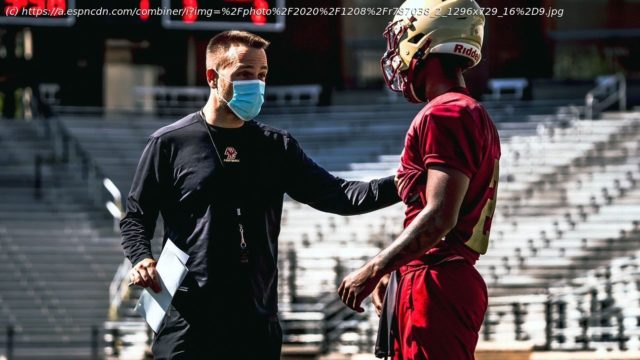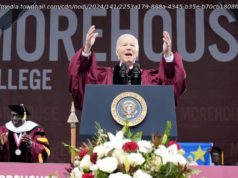As game cancellations and opt-outs have recently increased, college football — on the field — enters its most critical time, with playoffs and bowls up for grabs. Despite the season’s no guarantees motto, many within the sport say it’s been worth it.
A few days before Ohio State played Indiana last month, Buckeyes center Josh Myers detailed what has become his new routine this season: Wake up, drive to the football facility, log in for class on Zoom, take a coronavirus test, finish class, get ready for meetings, practice, eat and go home. There are no deviations on weekdays, no trips to the grocery store, no place to go other than his house and the facility, where he eats all three meals a day — socially distanced, of course. Myers also praised the lengths Ohio State coaches and medical staff went to with protocols — distanced team and position group meetings as well as avoiding clusters of players around each other at practice. The goal, of course, is to stay as safe as possible so the Buckeyes have a chance to compete for a national championship. “I can’t think of a worse situation than being undefeated and having games canceled to the point where we can’t make it to a conference championship because we haven’t played enough football games,” Myers said at the time. “That would be a living nightmare.” Only three weeks after talking to ESPN, Myers was one of 23 players unavailable to play against Michigan State after coronavirus issues swept through the program. Buckeyes coach Ryan Day tested positive and watched from home. Though Ohio State did not release information on positive results and contact-trace quarantines related to its players — or how the outbreak started — what happened in Columbus follows what myriad programs across the country have gone through since the season began in September. Even the best-laid plans and protocols can be rendered useless against a virus this relentless. With two games already canceled and this weekend’s Michigan contest up in the air, the sense of urgency is more intense at Ohio State, with a potential Big Ten championship game and a College Football Playoff spot on the line. But as game cancellations and player opt-outs have mushroomed recently, and as college football enters its most critical four weeks, a massive surge in COVID-19 cases within the United States is testing the notion that the season will conclude, as scheduled, with the national title game on Jan.11 in Miami. The hope is that the remaining bowl games will be played and a national champion will be crowned. The key word, of course, is hope. Because in this season, of all seasons, there are simply no guarantees — and that is something that hasn’t changed since August. “2020 has been a year where you’re not going to get everything that you want and you’ve got to find a way to make due,” said Miami coach Manny Diaz, whose No.10-ranked Hurricanes were recently unable to play for two weeks because of coronavirus issues of their own. “I don’t care if you’re undefeated and ranked No.1 or if you haven’t even won a game. It’s been a hard year.” Playing college football in the middle of a pandemic turned out to be a messy, disjointed, head-scratching and soul-searching endeavor. Though administrators predicted getting through it would be a grueling slog with stops, starts and, yes, cancellations, it was not until practices began that coaches and players got a window into what it would actually take to play. Interviews with coaches and players from multiple conferences and geographic areas reveal the different ways they went about trying to play a season as safely as possible within their respective programs. That includes asking players not to return home to visit family members; to stay in town during open dates; to limit interaction with anyone outside the football program; to avoid large gatherings; to always wear a mask; and, in rare instances, to room alone in a hotel for the entire season or move to an entirely different state just to play football.
Home
United States
USA — Sport How it started… and how it's going for college football amid COVID-19






